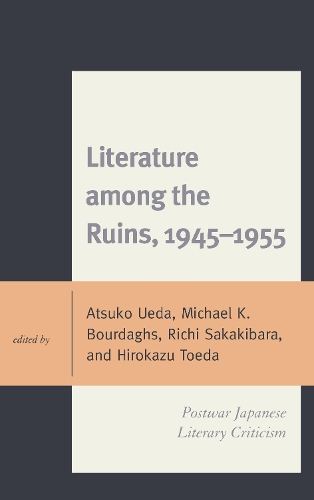
Literature among the Ruins, 19451955: Postwar Japanese Literary Criticism
(Hardback)
Available Formats
Publishing Details
Literature among the Ruins, 19451955: Postwar Japanese Literary Criticism
By (Author) Atsuko Ueda
Edited by Michael K. Bourdaghs
Edited by Richi Sakakibara
Edited by Hirokazu Toeda
Contributions by Michael K. Bourdaghs
Contributions by James Dorsey
Contributions by Ko Youngran
Contributions by Seiji M. Lippit
Contributions by Richi Sakakibara
Contributions by Ann Sherif
Bloomsbury Publishing PLC
Lexington Books
7th May 2018
United States
Classifications
Professional and Scholarly
Non Fiction
895.609005
Physical Properties
Hardback
202
Width 161mm, Height 232mm, Spine 22mm
494g
Description
In the wake of the disaster of 1945as Japan was forced to remake itself from empire to nation in the face of an uncertain global situationliterature and literary criticism emerged as highly contested sites. Today, this remarkable period holds rich potential for opening new dialogue between scholars in Japan and North America as we rethink the historical and contemporary significance of such ongoing questions as the meaning of the American occupation both inside and outside of Japan, the shifting semiotics of literature and politics, and the origins of what would become crucial ideological weapons of the cultural Cold War. The volume consists of three interrelated sections: Foregrounding the Cold War, Structures of Concealment: Cultural Anxieties, and Continuity and Discontinuity: Subjective Rupture and Dislocation. One way or another, the essays address the process through which new Japan was created in the postwar present, which signified an attempt to criticize and reevaluate the past. Examining postwar discourse from various angles, the essays highlight the manner in which anxieties of the future were projected onto the construction of the past, which manifest in varying disavowals and structures of concealment.
Reviews
This collection of essays by distinguished scholars on both sides of the Pacific is an excellent companion volume to The Politics and Literature Debate in Postwar Japanese Criticism, 194552. The provocative essays take up the topic of literary criticism in postwar Japan and open it up to rigorous and multifaceted examination. Japanese literary criticism was intensely argumentative during this period, embroiling writers in debates about political commitment, war responsibility, literary autonomy, and human subjectivity. These debates are discussed and contextualized here in admirably lucid prose. This is essential reading for students and scholars of modern Japan, but is also highly recommended to anyone whose reading and thinking touch on the relation of art and politics in the modern world. -- Ayako Kano, University of Pennsylvania
Literature among the Ruins, 19451955 takes up the most vital debates of Japan's immediate postwar period, an era of great hardship that saw profound reflections on literatures relationship to individual political agency. This collection of critical essaysdrawn from leading scholars in both the United States and Japanilluminates what was at stake then and what remains relevant today. It is essential reading for anyone interested in the relationship between culture and power in the twentieth century. -- Edward Mack, University of Washington
This work, together with its companion volume, The Politics and Literature Debate in Postwar Japanese Criticism, 194552, fills a substantial lacuna in postwar scholarship on Japan. While the essays collectively address the question of literature, the complex relations literature invariably maintains with history and the political are examined here with remarkable insight. The core notion of literature among the ruins helps pave the way for a rethinking of trauma beyond the personal in properly geopolitical terms. -- Richard Calichman, City College of New York
Author Bio
Atsuko Ueda is associate professor of modern Japanese literature at Princeton University. Michael K. Bourdaghs is Robert S. Ingersoll Professor in East Asian Languages and Civilizations at the University of Chicago. Richi Sakakibara is professor of modern Japanese literature at Waseda University. Hirokazu Toeda is professor of modern Japanese literature at Waseda University.
